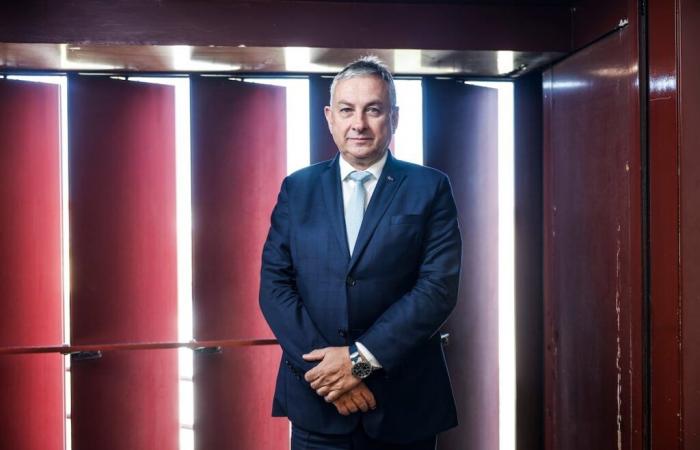
Joef Síkela, (Rokycany, Czech Republic, 57 years old) is in charge of building the International agreements of the European Union. Since last December, he is the International Cooperation Commissioner, a position from which he manages the Global Gateway initiative, a commission program that will mobilize 300,000 million euros between 2021 and 2027. With this program, Brussels hope to underpin its geopolitical presence, at a time of replication of the United States and growing influence of the powers that Sikela calls as its “rivals” The silk – and Russia.
The European commissioner received El País on Wednesday in Madrid, on the eve of Europe, to talk about the external challenges facing the old continent.
Ask. After the decision of the US president, Donald Trump, to suspend Usaid [siglas en inglés de la agencia de cooperación estadounidense]countries such as the United Kingdom, Germany, France and the Netherlands have also announced cuts in development aid. Is this help in crisis?
Answer. [La decisión de suspender USAID] It is a bad message for the development agenda, because the gap to achieve sustainable development objectives [ODS] It’s huge, four billion dollars [unos 3,68 billones de euros]. We deeply regret that decision. However, it is also an opportunity and we have to take advantage of it. Because there is a threat: if we do not, we leave that vehicle to our rivals, such as China and Russia. And we are already seeing what it means, for example, in the Sahel. Europe is the largest sponsor of the development agenda. We will continue to be a reliable partner, although some of the countries probably reduce – ill, I hope – their contributions, due to defense spending and other issues.
P. The cuts in Usaid have intensified the debates around the “decolonization” of the foreign aid system. In a report recently published in this newspaper, several humanitarian workers criticized the narrative of the “White Salvador” in cooperation. Do you think that European aid initiatives empower receiving countries, giving them voice and decision power?
R. What we have to offer is sustainable future, which means employment creation, value chains, access to education … but also access to world markets, because we see that the fragmented development aid for development has not given the expected results. Therefore, we have to focus on the economic impact of investments. The second reason is that we need to attract private capital. when I meet with the representatives of our associated countries, they ask me when the new investments will come, to what I say: “It depends on you.” Business decides where and when to go. We can help them create a more favorable environment for investment. This is how we can help with sustainable development.
P. Some helping countries are subject to economic sanctions, such as Cuba. In the light of public and private investment initiatives, to what extent these sanctions hinder their development?
R. We will always act according to our fundamental values, democracy and human rights. We do not want to collaborate with non -democratic regimes; But also in these countries there are people in need. So we always look for ways to help these people in a very fragile context. Syria, Afghanistan … also in Cuba there are many people in need. Of course, we prefer to collaborate with partners who share our basic values and principles. However, we also have our duties when it comes to extremely fragile contexts.
The Celac-Eue Summit is a momentum politician, with real investment opportunities
-JOZEF Síkela, Commissioner for International Cooperation
P. Gustavo Petro, president of Colombia and Rotary President of the CELAC, has defended the proposal to change the external debt of countries for climatic actions. Is this a viable strategy?
R. Debt relief is a complicated issue, because a precedent is created. Debt is like fire: it is a good servant, but it can be a very bad tool. This is what we experience in the past: expensive loans granted by our competitors knowing that they were hardly reimbursable and then put them against the debtor to negotiate much more hard conditions. This is not the way we want to work. When we grant a loan, it is based on viability studies that can be paid. [Reemplazar deuda por acciones climáticas] It is a very interesting idea that could help. But it cannot be that Europe cancel loans and others as China do not. So we discuss the issue, also with the financial institutions involved, such as the World Bank. But I think it’s very difficult.
P. One of the objectives of the Global Gateway is to implement the 2030 Agenda beyond the EU borders. But at the same time, the extreme European right criticizes these objectives as an “ideological agenda” that undermines “traditional values.” In the light of these criticisms, do you see the EU promotes these principles?
R. I don’t think the SDGs are criticized in Europe. Criticisms are mainly aimed at their affordability, costs. We are experiencing high energy costs in Europe. We hear companies say that we are losing competitiveness because energy is much cheaper in Asia and in the US. Each additional ton of co₂ saved in Europe is extremely expensive. Global Gateway is offering a solution to meet the climatic objectives through decarbonization on other continents.
There are ways to help sustainable industrialization. We have to help with renewable energy and this is the way to limit criticism in Europe, to convince European citizens that, if we do not invest today, the cost in the future will be much greater. Climate change will not disappear if we do not talk about it: this is like a disease, if there is no talk of symptoms does not mean that the disease has disappeared. So we stick to these goals and we just have to be more pragmatic. Maybe not always strive for the perfect, but very expensive solution … perhaps, an 80% solution that costs only half.
P. There are influential figures in America, such as Trump, the president of Argentina, Javier Milei, or the former president of Brazil, Jair Bolsonaro, who question the SDGs from an ideological perspective. Is that an obstacle to the implementation of the objectives that the EU has in Latin America?
R. I don’t believe it. We can turn it into an advantage. This sustainable agenda will not disappear. So if someone stopped investing in it, they can create an advantage for us, because if we move on, we will even improve the technologies we have available and we can monetize them in the future. But we must be fast, be more focused, more selective.





